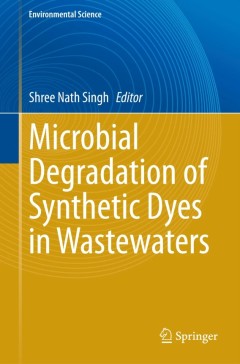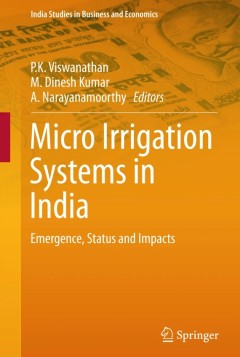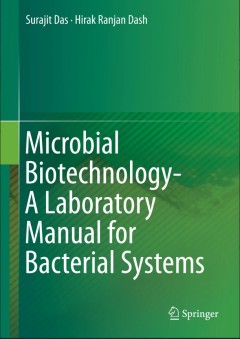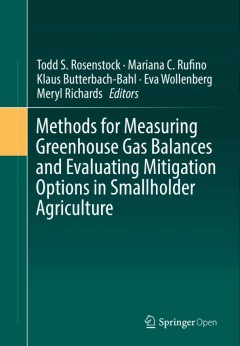Filter by

The Sava River
This volume provides a comprehensive overview of environmental aspects of the Sava River, which is the greatest tributary to the Danube River and the major drainage river system of South Eastern Europe. Hydroelectric power plants, river traffic, intensive agricultural activities, heavy industry and floods have considerable influence on the environment and biota in the basin. Summarizing the res…
- Edition
- -
- ISBN/ISSN
- 978-3-662-44034-6
- Collation
- -
- Series Title
- -
- Call Number
- -

Methane Combustion over Lanthanum-based Perovskite Mixed Oxides
This book presents current research into the catalytic combustion of methane using perovskite-type oxides (ABO3). Catalytic combustion has been developed as a method of promoting efficient combustion with minimum pollutant formation as compared to conventional catalytic combustion. Recent theoretical and experimental studies have recommended that noble metals supported on (ABO3) with well-order…
- Edition
- 1
- ISBN/ISSN
- 978-3-662-46990-3
- Collation
- XXII, 103
- Series Title
- Springer Theses
- Call Number
- -

The Role of Natural and Constructed Wetlands in Nutrient Cycling and Retentio…
Natural and constructed wetlands play a very important role on the landscape and their ecological services are highly valuable. In fact, some wetland types are regarded as one of the most valuable ecosystems on the Earth. Water management, including flood water retention, biomass production, carbon sequestration, wastewater treatment and biodiversity sources, are among the most important ecolog…
- Edition
- -
- ISBN/ISSN
- 978-3-319-08177-9
- Collation
- -
- Series Title
- -
- Call Number
- -

Microbial Degradation of Synthetic Dyes in Wastewaters
Today synthetic dyes are used extensively in the textile dyeing, paper printing, color photography, pharmaceuticals, food and drink, cosmetic and leather industries. As of now, over 100,000 different dyes are available, with an annual production of over 700,000 metric tons. These industries discharge an enormous amount of colored effluents into natural water bodies, with or without treatment. T…
- Edition
- 1
- ISBN/ISSN
- 978-3-319-10941-1
- Collation
- XIV, 367
- Series Title
- Environmental Science and Engineering
- Call Number
- -

Micro Irrigation Systems in India
This book takes stock of micro irrigation systems (MIS), the technological intervention in India’s agricultural and water management sectors, over the past couple of decades. Based on empirical research from the major agriculturally dynamic states, viz., Gujarat, Rajasthan, Maharashtra, Tamil Nadu, Andhra Pradesh and Karnataka, the book provides a nuanced understanding and objective assessmen…
- Edition
- -
- ISBN/ISSN
- 978-981-10-0346-2
- Collation
- XIV, 178
- Series Title
- India Studies in Business and Economics
- Call Number
- -

Microbial Biotechnology- A Laboratory Manual for Bacterial Systems
Microorganisms play an important role in the maintenance of the ecosystem structure and function. Bacteria constitute the major part of the microorganisms and possess tremendous potential in many important applications from environmental clean up to the drug discovery. Much advancement has been taken place in the field of research on bacterial systems. This book summarizes the experimental setu…
- Edition
- 1
- ISBN/ISSN
- 978-81-322-2094-7
- Collation
- XVI, 239
- Series Title
- -
- Call Number
- -

Methods for Measuring Greenhouse Gas Balances and Evaluating Mitigation Optio…
This book provides standards and guidelines for quantifying greenhouse gas emissions and removals in smallholder agricultural systems and comparing options for climate change mitigation based on emission reductions and livelihood trade-offs. Globally, agriculture is directly responsible for about 11% of annual greenhouse gas (GHG) emissions and induces an additional 17% through land use c…
- Edition
- 1
- ISBN/ISSN
- 978-3-319-29792-7
- Collation
- xv, 203
- Series Title
- -
- Call Number
- -

Microbial Degradation of Synthetic Dyes in Wastewaters
Today synthetic dyes are used extensively in the textile dyeing, paper printing, color photography, pharmaceuticals, food and drink, cosmetic and leather industries. As of now, over 100,000 different dyes are available, with an annual production of over 700,000 metric tons. These industries discharge an enormous amount of colored effluents into natural water bodies, with or without treatment. T…
- Edition
- 1
- ISBN/ISSN
- 978-3-319-10941-1
- Collation
- XIV, 367
- Series Title
- Environmental Science and Engineering
- Call Number
- -

Microbial Biotechnology- A Laboratory Manual for Bacterial Systems
Microorganisms play an important role in the maintenance of the ecosystem structure and function. Bacteria constitute the major part of the microorganisms and possess tremendous potential in many important applications from environmental clean up to the drug discovery. Much advancement has been taken place in the field of research on bacterial systems. This book summarizes the experimental setu…
- Edition
- 1
- ISBN/ISSN
- 978-81-322-2094-7
- Collation
- XVI, 239
- Series Title
- -
- Call Number
- -

Beyond Money : A Postcapitalist Strategy
A fascinating portal into arguments about why we need to get beyond money' - Harry Cleaver What would a world without money look like? This book is a lively thought experiment that deepens our understanding of how money is the driver of political power, environmental destruction and social inequality today, arguing that it has to be abolished rather than repurposed to achieve a postcapitalis…
- Edition
- -
- ISBN/ISSN
- 9781786807809
- Collation
- -
- Series Title
- -
- Call Number
- -
 Computer Science, Information & General Works
Computer Science, Information & General Works  Philosophy & Psychology
Philosophy & Psychology  Religion
Religion  Social Sciences
Social Sciences  Language
Language  Pure Science
Pure Science  Applied Sciences
Applied Sciences  Art & Recreation
Art & Recreation  Literature
Literature  History & Geography
History & Geography